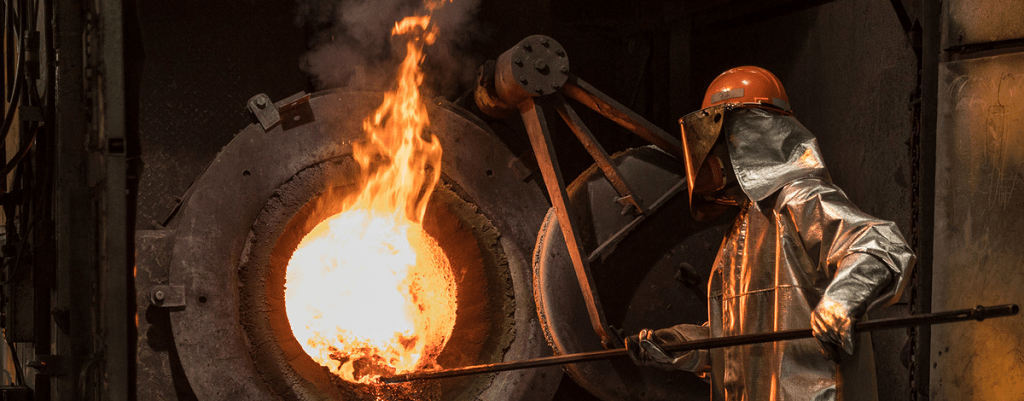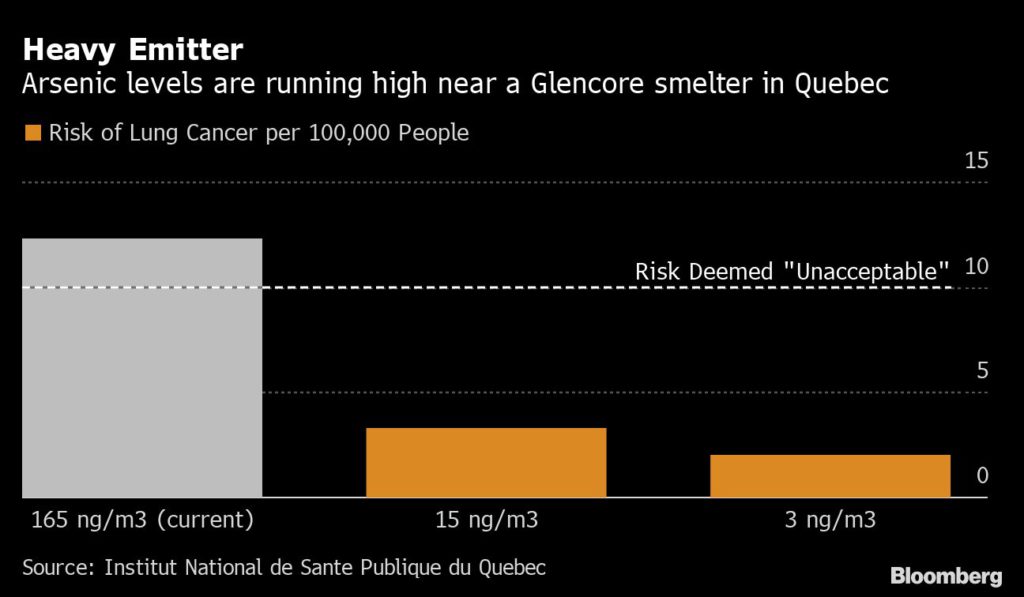Bloomberg News | August 10, 2022 |

Credit: Glencore Canada
Quebec’s public health director took aim at Glencore Plc for toxic emissions at a copper smelter in the province’s northwest, saying the level of pollution must be brought down quickly because of evidence it’s causing increased risk of cancer and other health problems.

The Horne Smelter in Rouyn-Noranda, a remote city about 600 kilometers (373 miles) northwest of Montreal, is emitting 165 nanograms of arsenic per cubic meter of air on site, according to a recent study by public health authorities in the Canadian province. That’s 55 times the standard safe level of 3 nanograms.

It must be brought down to 15 nanograms, according to Luc Boileau, who was appointed this year as Quebec’s top public health official.
“The actual situation from the Horne Smelter is not acceptable,” Boileau said. “At a threshold of 15 nanograms, the protection objectives will be achieved. It reduces the risk of lung cancer for the general population.” In a neighborhood near the plant, arsenic pollution is 90 nanograms, or 30 times the standard.
The smelter, in operation since 1926, has taken center stage in Quebec’s news media after data showed the population of Rouyn-Noranda has a higher percentage of chronic obstructive pulmonary disease than the provincial average. More than 50 health professionals from the region signed a letter calling on the government to apply air-quality standards.
“We take note of the recommendation issued today by the National Director of Public Health regarding air quality in Rouyn-Noranda, and are sensitive to the concerns expressed about the well-being of the community,” Glencore spokesperson Alexis Segal said in an emailed statement.
“We are more determined than ever to minimize our environmental footprint and offer our full cooperation to reduce our emissions to a minimum,” Segal said, adding that the company will unveil an action plan “in the coming days.”
Quebec’s public health director took aim at Glencore Plc for toxic emissions at a copper smelter in the province’s northwest, saying the level of pollution must be brought down quickly because of evidence it’s causing increased risk of cancer and other health problems.

The Horne Smelter in Rouyn-Noranda, a remote city about 600 kilometers (373 miles) northwest of Montreal, is emitting 165 nanograms of arsenic per cubic meter of air on site, according to a recent study by public health authorities in the Canadian province. That’s 55 times the standard safe level of 3 nanograms.

It must be brought down to 15 nanograms, according to Luc Boileau, who was appointed this year as Quebec’s top public health official.
“The actual situation from the Horne Smelter is not acceptable,” Boileau said. “At a threshold of 15 nanograms, the protection objectives will be achieved. It reduces the risk of lung cancer for the general population.” In a neighborhood near the plant, arsenic pollution is 90 nanograms, or 30 times the standard.
The smelter, in operation since 1926, has taken center stage in Quebec’s news media after data showed the population of Rouyn-Noranda has a higher percentage of chronic obstructive pulmonary disease than the provincial average. More than 50 health professionals from the region signed a letter calling on the government to apply air-quality standards.
“We take note of the recommendation issued today by the National Director of Public Health regarding air quality in Rouyn-Noranda, and are sensitive to the concerns expressed about the well-being of the community,” Glencore spokesperson Alexis Segal said in an emailed statement.
“We are more determined than ever to minimize our environmental footprint and offer our full cooperation to reduce our emissions to a minimum,” Segal said, adding that the company will unveil an action plan “in the coming days.”

In July, the Institut National de Sante Publique du Quebec, an agency that assists in public health decisions, said that the risk of cancer due to arsenic and cadmium in the air “exceeds the value considered negligible.”
Quebec’s environment ministry is in talks with Glencore about its plan to lower emissions. Premier Francois Legault threatened to close the plant if the company doesn’t act, though he didn’t exclude the possibility the government may offer financial help to modernize the facilities.
The Syndicat des Metallos, a union representing more than 1,500 Glencore employees in Quebec, has been told by the company it will invest C$1.5 billion ($1.2 billion) in the smelter over the next 10 years to reduce arsenic and greenhouse gas emissions.
According to Glencore, the Horne plant is the only copper smelter still operating in Canada, contributes C$500 million to Quebec’s gross domestic product and represents more than 650 direct and 1,850 indirect jobs.
(By Mathieu Dion, with assistance from Erik Hertzberg)
No comments:
Post a Comment